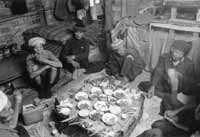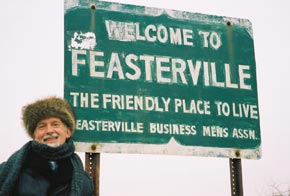 |
 |
 |
 |
 |
 |
|
 |
 |
Feasting Research |  |
 |
||
 |

 Akha lineage heads feasting. Hmong funeral feast. |
 |
||||
|
|
||||||
 |
Feasting, like kinship, marriage, and language, is a universal feature of human societies. From our modern perspective, it often seems like a frivolous, self-indulgent accessory to more serious aspects of life such as economics, politics, and religion. Thus, with some important exceptions, feasting has been largely ignored as a topic of serious study or theoretical modeling by both ethnographers and archaeologists. However, recent research has indicated that very large amounts of time, energy, and resources were (and are) frequently consumed at feasts in traditional societies. In fact, feasts constituted the largest, most important events in many traditional cultures. From a cultural ecological perspective, behaviors that entail major expenditures of time, energy, and resources should have some practical benefits or adaptive advantages. In 1992, I began ethnoarchaeological research in Southeast Asia in order to determine whether any significant practical advantages did, in fact, accrue to the hosts of feasts in traditional societies as a test of the cultural ecological paradigm. The results have been very rewarding. Traditional feasting
emerges as the most important institution for transforming
surplus food into other desirable services, relationships, or
goods. It is critical in the functioning of village politics,
social relationships, and economics. Michael Clarke has compared
it in importance and function to congress or parliament. One of
the main practical functions of traditional feasts is to
establish support groups for the many risks that confront
families in traditional villages. Moreover, because most feasts
are reciprocal and involve gifts of prestigeous foods, they can
be manipulated by the ambitious so as to concentrate wealth and
debts in their own hands. Thus, successful feasters often have
the most families and the most productive wives, the most
domestic animals, the largest and best land, and the most exotic
trade goods. They also have the best allies in the event of any
armed conflicts. In short, successful feasting provides wealth,
military advantages, reproductive advantages, political
advantages and advantages for almost all areas involving
self-interest. For example see my paper on funeral feasts ( From an ecological perspective, human feasting is unique in the biological world because it is the only means of transforming surplus production into other services, relationships, or goods that confer practical or adaptive advantages. Because of this, feasting systems generate constant pressures to produce ever more surpluses that are used to create ever more political power and wealth, which in turn are used to generate ever more economic advantages and surpluses. This constitutes a positive feedback system which has driven the emergence of socioeconomic inequality, the domestication of plants and animals, logarithmic population growth, and has ultimately brought our world to its present state of crisis. In sum, we have found that far from being a frivolous topic of little concern, the study of feasting is critical to understanding the major changes in human culture over the last 50,000 years and to understanding the origins of our own society.
Current Research Projects:
|
 |
||||
 Funerals
as Feasts –
Funerals
as Feasts – 